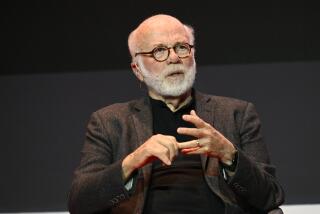‘Three Cups’ author Greg Mortenson must pay $1 million to charity
The road to hell is typically paved with good intentions. For Greg Mortenson, it was laid down with two New York Times bestsellers, hundreds of public appearances and the idea that Afghanistan and Pakistan could be saved if you built enough schools in them.
Hidden beneath those efforts appear to have been “significant lapses in judgment” involving charity money. Those lapses have led the Montana state attorney general to toss Mortenson out of his own charity, the Central Asia Institute, and now to force him to pay back $1 million, according to the results of an investigation announced Thursday.
“The story of Central Asia Institute and Greg Mortenson evokes notions of the best of our aspirations to do good and the generosity of the American public,” Montana Atty. Gen. Steve Bullock wrote about the charity, based in Bozeman, Mont. “It involves the efforts of a complicated person who has worked tirelessly on behalf of a noble pursuit, even while acting in a way that jeopardized that pursuit.”
That “way” involved donor money — given to promote education and literacy in war-torn and impoverished Central Asia — being spent on charter flights for family vacations, clothing and Internet downloads, the report said. The charismatic Mortenson, whose personal wealth “multiplied significantly” as the charity grew more popular, also took inappropriate speaking fees from the charity for his promotional work, the investigation found.
Many of his presentations centered on experiences he wrote about in his book, “Three Cups of Tea,” a dramatic chronicle of how he became a humanitarian in Central Asia.
The Central Asia Institute’s board failed to properly manage the charity for 10 years, by the Montana attorney general’s reckoning. For that, the state negotiated a settlement that will allow the charity to keep running — except with stricter control over its finances and without its two remaining board members. They’ll leave in a year and be replaced by a new seven-member board.
Mortenson formally stepped down as executive director in November and has already paid back half of the $1 million he owes to the charity.
Its interim executive director, Anne Beyersdorfer, told the Associated Press that Mortenson would remain a paid employee of the charity but would not serve on the new board.
“He’s the heart and soul of the organization,” Beyersdorfer said. “He’s the co-founder, and I think we all think of him as our chief inspiration officer.”
The investigation was spurred by damning investigations into the charity and Mortenson’s past published a year ago by “60 Minutes” and by fellow bestselling author Jon Krakauer (“Into Thin Air,” “Where Men Win Glory”). Krakauer’s massive exposé, “Three Cups of Deceit,” savaged Mortenson and his work.
“The image of Mortenson that has been created for public consumption is an artifact born of fantasy, audacity, and an apparently insatiable hunger for esteem,” wrote Krakauer, a former Central Asia Institute donor who became one of the charity’s most dogged critics.
“Mortenson has lied about the noble deeds he has done, the risks he has taken, the people he has met, the number of schools he has built. ‘Three Cups of Tea’ has much in common with ‘A Million Little Pieces,’ the infamous autobiography by James Frey that was exposed as a sham.”
The charity has spent $4 million since 2006 buying copies of “Three Cups of Tea” and “Stones Into Schools” to give away to schools and libraries to promote its work; it has also spent $5 million advertising the books, according to the Montana attorney general’s office.
The results of the investigation come at a sensitive time for American charities working in the developing world.
San Diego-based Invisible Children, aimed at stopping Ugandan warlord Joseph Kony, received intense criticism after releasing “Kony2012,” a powerful 30-minute advocacy video thought to have become the most viral video of all time. The reaction was so intense that co-founder Jason Russell suffered a “brief reactive psychosis” because of stress and dehydration, his family said, leading him to run naked through the streets of San Diego.
That charity has been criticized in similar fashion to the way Mortenson’s has — too much money spent on promotion and too little on relief work; too much attention on rock-star charity workers and not enough on the people they’re helping; and too much emphasis on fundraising and too few tough questions about how the charity is doing and why it even exists.
The last question is one that has struck a nerve in popular debate lately, particularly among liberals. In a widely shared article for the Atlantic, novelist Teju Cole decried the “White Savior Industrial Complex” that he said “exists simply to satisfy the needs — including, importantly, the sentimental needs — of white people and Oprah.”
“If Americans want to care about Africa, maybe they should consider evaluating American foreign policy, which they already play a direct role in through elections, before they impose themselves on Africa itself,” Cole wrote. He added later: “If we are going to interfere in the lives of others, a little due diligence is a minimum requirement.”
Invisible Children’s “Kony 2012,” which called for the U.S. to help arm Ugandan forces to “stop Joseph Kony,” was met with confusion and even anger in Uganda, which Kony fled six years ago. (Invisible Children released a second video Thursday largely defending the previous video.) And Mortenson’s Central Asia Institute has been accused of claiming to build schools that either weren’t needed — half of the 30 schools visited by “60 Minutes” were empty — or don’t exist.
“So how many schools has CAI [Central Asia Institute] actually built in Pakistan and Afghanistan?” Krakauer wrote last September. “Nobody knows. Not even Mortenson knows, because over the past eight or nine years he’s repeatedly thwarted efforts by his Montana-based staff to track how many schools have been built, how much each school really costs, and how many schools are functional.”
The Montana investigation released Thursday focused on the Central Asia Institute’s domestic operations in Montana and found that its board “failed to fulfill some of its important responsibilities in governing the nonprofit charity.”
Mortenson, for example, was “double-dipping,” investigators said, taking travel expenses from his charity and from event sponsors around the country who thought they were paying his way. A 2003 audit also turned up problems with the charity’s finances that led the board not to fix the problems but to cancel further audits, the report said. Those same problems cropped up when audits were conducted again in 2009 and 2010.
But damning the charity itself can be problematic, as the Montana attorney general’s office found while investigating Mortenson’s fellow board members, who it said had failed since 2004 to take proper care of the charity under Montana law.
“The altruistic motives and sincere commitment to CAI’s mission by each person who has served on CAI’s board cannot be doubted,” the report said. “It was evident when they were interviewed that they each believe deeply in the charity’s mission, and want it to succeed.”
So does the Montana attorney general, Bullock, who wrote in the report that “despite the severity of their errors, CAI is worth saving.”
ALSO:
Trayvon Martin case: Top Southern Baptist decries ‘race hustlers’
Tennessee woman arrested for calling 911 to report ‘nasty’ burger
The JetBlue pilot and the midair meltdown: Judge orders psych exam
Twitter.com/mattdpearce
More to Read
Start your day right
Sign up for Essential California for news, features and recommendations from the L.A. Times and beyond in your inbox six days a week.
You may occasionally receive promotional content from the Los Angeles Times.







